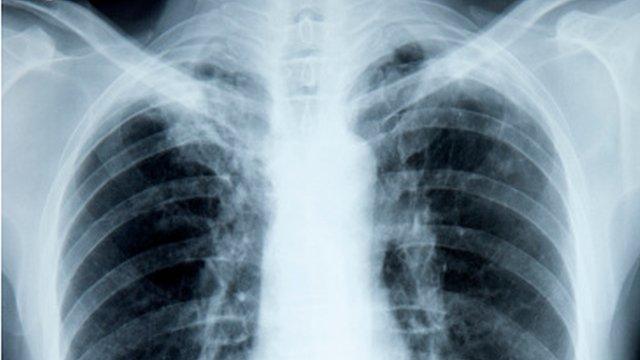Call for lung cancer screening in UK
- Published

Delays introducing lung cancer screening in the UK could cost thousands of lives, warns a leading cancer expert.
Prof John Field of Liverpool University says planning should start now for nationwide screening of older smokers by the end of 2016.
US data suggests screening can detect lung cancer early, leading to 20% fewer deaths, he told Nature journal.
Currently, 75% of lung cancer patients are diagnosed too late to save them.
Prof Field, who is leading the UK Lung Cancer Screening trial (UKLS), said that in 2012 someone died of lung cancer in the European Union every two minutes.
"The good news is that screening for lung cancer using low-dose computed tomography [CT scans] could reduce this enormous burden of mortality, through early detection and treatment that improves survival," he said.
"Every year we delay could needlessly sacrifice tens of thousands to the world's biggest cancer killer."
Trials under way
US guidelines suggest older people with a history of heavy smoking should be offered annual low-dose CT scans to screen for lung cancer.
The test is recommended for people aged 55 to 80 who smoked a packet of cigarettes a day for 30 years, or the equivalent.
Private insurers already cover the scans, while Medicare, the federal agency that insures Americans, is expected to make a decision in November.
In Europe, health authorities are waiting for the findings of screening trials in Belgium and the Netherlands (Nelson trial), and several other pilots, including in the UK.

Low-dose CT was better than chest X-rays in a large US study
"It's important that we start to plan for lung cancer screening in the UK. We now have a window of opportunity to do this as we await the Nelson and pooled European trial data, which will provide us with both cost-effectiveness and mortality data," Prof Field told the BBC.
"We would hope we will have this data by the end of 2016 and if it confirms the benefits of CT screening, we will be in a position to take lung cancer screening forward."
While the US evidence suggests that low-dose CT screening can reduce lung cancer deaths, the possible harms must be balanced with the benefits.
Concerns include false positive results, radiation exposure and costs.
Dr Anne Mackie, director of programmes for the UK National Screening Committee (NSC), part of Public Health England, said the committee recognised that lung cancer was "an incredibly important public health issue".
"A large European research study is testing whether screening can save lives and a UK pilot of lung screening in Liverpool is evaluating the effectiveness within the UK.
"We are in contact with scientists working in both studies and the results, as soon as they are available, will contribute to the UK NSC's recommendation on whether to introduce a screening programme.
"A screening programme will only be recommended if the benefits clearly outweigh the harms following an assessment of the evidence against internationally agreed criteria, external."
Lung cancer kills more than 35,000 people a year and is the biggest cause of cancer death in the UK.
About 70% of patients will survive their disease for a year or more if it is diagnosed at its earliest stage.
- Published30 October 2013

- Published18 July 2013
